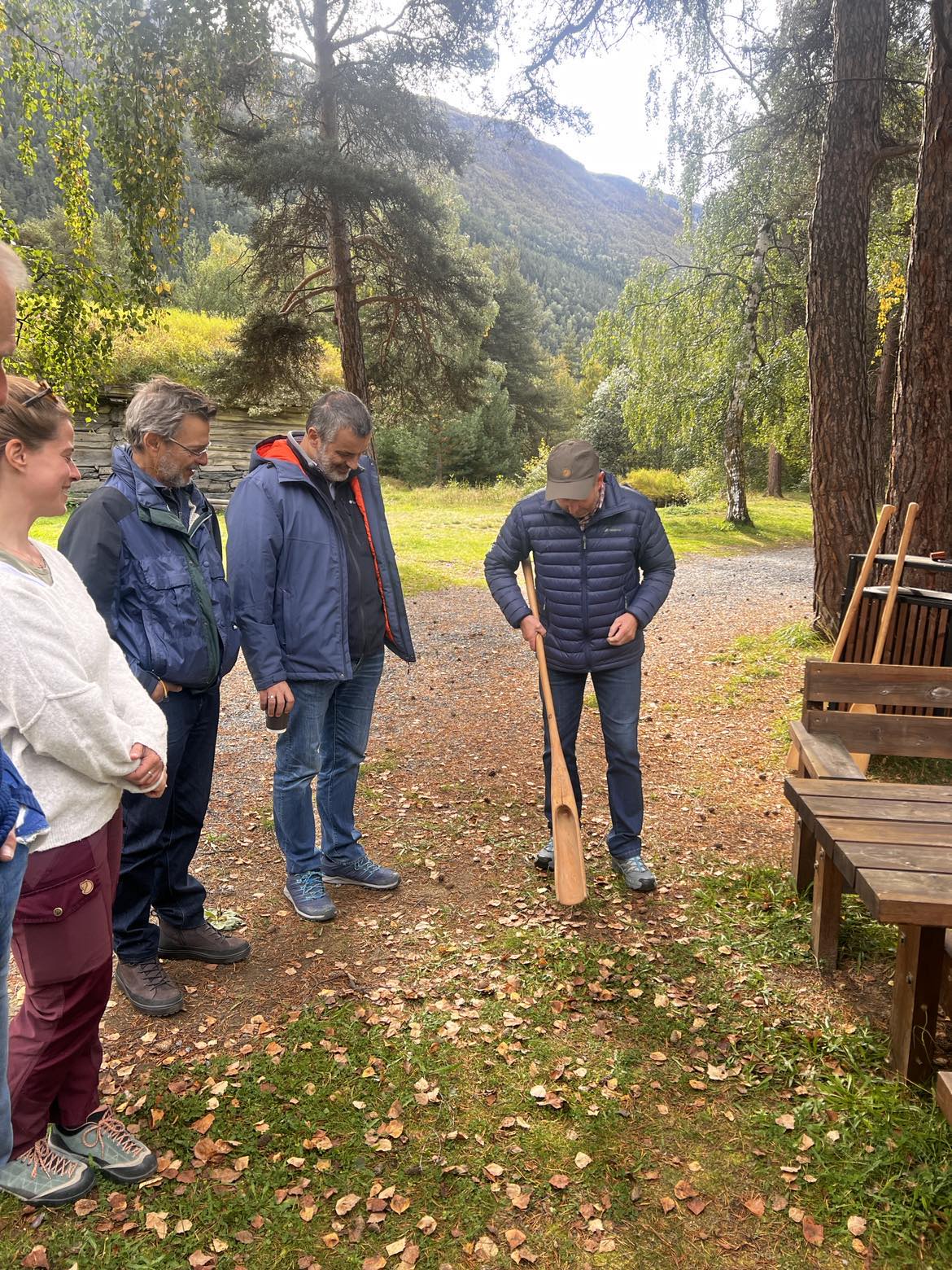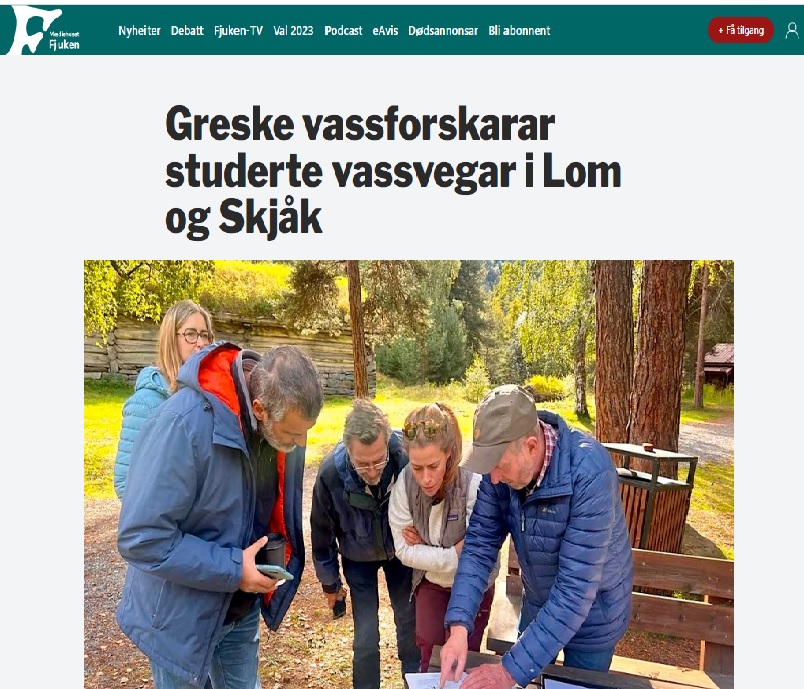Is it a giant spoon or an old-fashioned shovel? And what does it have to do with water? Four Greek water researchers from the Hellenic Centre for Marine Research (HMCR), Institute of Marine Biological Resources and Inland Waters in Athens, gather the mountain village of Lom and study a traditional wooden scoop. With graceful movements, guide and farmer Nils Teigen demonstrates how the tool is used to distribute water across the field.

Picture: Windy Kester Moe
The Greek researchers are on a four-day study trip in Norway as part of the Water Matters-project. This is a campaign funded through EEA Grants Norway, where researchers aim to increase knowledge and awareness about clean water and good water management on six Greek islands. Eastern Norway Research Institute (ENRI) at Inland Norway University of Applied Sciences is the Norwegian partner in this project.
"The waterways in Sjåk and Lom serve as a good, historical, example of innovative water management, showcasing what is required in terms of community effort, collaboration, resources, and sustainability to bring forth and distribute water for livelihoods. It can be challenging to realize this in a modern society where we often take such infrastructure for granted. This is why we have chosen it as a Norwegian case study in the project," says ENRI-researcher Tor Arnesen.
The goal is to provide examples that can contribute to the Greek efforts to break the vicious cycle of water overuse that the holiday islands have fallen into.
During their study trip in Norway, the Greeks gain insights into the significance of water from historical, cultural, and economic perspectives.
A Common Good
But waterways are not just history; in some places, they still exist in a developed form.
Philosopher and farmer Sæbjørn Forberg shares his Fjuken irrigation system, which supplies water from the mountains to four farms, and discusses the importance of waterways: it is cost-effective, sustainable, and steeped in tradition. Forberg reflects on why the waterway continues to function today as a common good. The recipe includes:
- Fewer participants make it easier to organize and maintain.
- Collaboration is necessary; not everyone can have their own system.
- Transparent local communities ensure that everyone contributes more or less equally.
- Self-governance, yes, but with a functioning legal system that provides support.
- Sustainable management aligns with the farmer's ethos: leave the farm in better condition than when you inherited it."
"The example of the boardwalk waterways represents a unique traditional practice in water management that shares similarities with practices found on some dry Greek islands," says Argiro Andriopoulou, the Greek project leader of Water Matters from HCMR. "We have small-scale stone dams along periodic riverbeds," adds the biologist. Many of these systems on Greek islands are now unused, but she emphasizes that local knowledge and cultural heritage can serve as a compass for sustainable development.
Mjøsaksjonen
During a workshop with Asle Øksenrud from NIVA and Ola Hegge from the Office of the Governor of Innlandet the day before, another excellent example of collective effort came to light: the Mjøsaksjon, an environmental campaign that in the 1970s reduced pollution in Lake Mjøsa and ensured clean drinking water for the surrounding areas. Here, too, there were discussions about what could be applied to a Greek context. "An initiative like this requires strong collaboration between the public and authorities and trust in each other," they noted.
Download the presentation: Operational monitoring in Lake Mjøsa and its tributaries – past, present, and future!
Download the presentation: Norwegian water management – Do we achive good ecological status?
From the workshop in Lillehammer, the group follows the river Laagen upstream through the Gudbrandsdalen valley and gains insight into the historical development of hydropower and river regulation. Arnesen explains, "The history of Norwegian hydropower development is reflected, not least, in the Glomma Laagen watercourse. This includes multiple interests, the emergence of environmental considerations, securing a local share of value creation, and, most importantly, the role of municipalities as entrepreneurs in the early stages of this development."
The report "Glomma and Laagen River Basin Case Study-Norway" documents the pre-project phase of a case study on the effects of regulatory dams in the Glomma and Laagen river basins. This study is part of the work of the World Commission on Dams on the impacts of large dams and represents one of 9 case studies on this topic in various parts of the world (1999).
Paradox
Upon arrival in Lom, at the Mountain Museum, the paradox of climate change becomes evident: the ice that has served as a freezer for thousands of years is melting and revealing incredible archaeological discoveries. Here, the Greeks are among the first to see the latest archaeological find: a well-preserved arrowhead made of shell. The arrowhead dates back to the early Bronze Age and was found on the northeastern edge of Jotunheimen, with the ice preserving the organic material.
After visiting the Mountain Museum, it's time to explore other aspects of water: the ice tunnel and Climate Park 2469. And at the viewpoint overlooking the rapidly diminishing ice sheet, the conclusion is clear: water is a concern, also in Norway.




